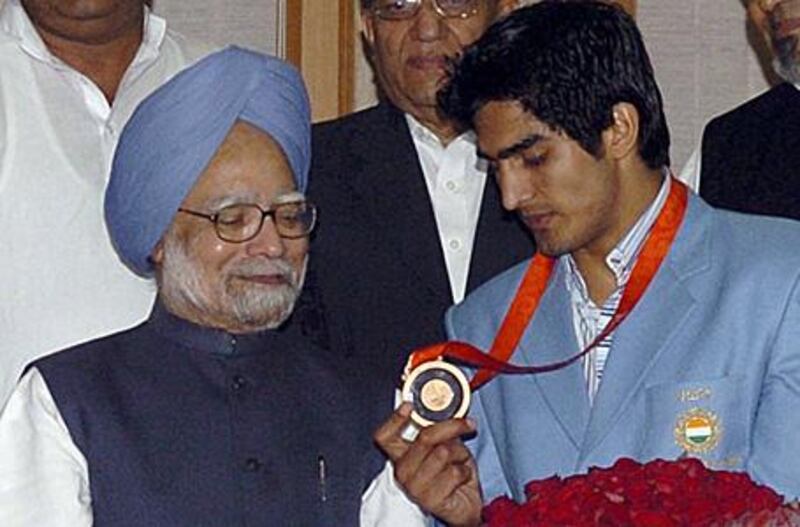Just last week, MS Dhoni's band of cricketers achieved an unprecedented hat-trick of one-day series wins in Sri Lanka. There was an Indian presence in the mixed doubles as well as doubles finals at the US Open tennis. On Sunday, India qualified for the Davis Cup World Group in style. Earlier, boxer Vijender Singh became the first Indian to win a medal at the World Championships, Force India achieved a podium finish at the Belgian GP and points in Monza and India's footballers won the Nehru Cup by beating Syria.
India has made a statement to the sporting world: "We mean business." But business is the very word that could ruin things for a country terribly short of sporting icons. Or rather, non-cricketing icons. Why do I say this when those with cold, hard cash are coming forward to sponsor sporting figures and teams like never before? It is because Indian athletes, especially the younger ones, are often no experts when it comes to dealing with success that comes quickly.
Ever heard of a cricketer named Vinod Kambli? Those who saw him in his formative years were convinced he had more talent than his friend and peer Sachin Tendulkar. Kambli faltered in the one-day game, but enjoyed a rousing start to his Test career in 1992. He hit two double hundreds on the trot that season but did not play a Test after 1995. As much as experts reckoned he could not handle the short ball, he could not handle the success that came his way.
As time went on he made several comebacks with the one-day team, but just did not have the ingredients to sustain success - a far cry from Tendulkar's ability and mission. Kambli remains the jovial, big-hearted and gregarious man but not many take him seriously. His is a classic case in the world of Indian sport. The Indian Premier League, for all its glitz and glamour, could turn out to be an open manhole in the path of many a young player.
Youngsters today are hardly known for their humility or balance. At an annual cricket award function organised in Mumbai on the eve of the Indian team's departure to South Africa for the Champions Trophy, there were a few Indian players who did not turn up even though it was held in the same hotel they were put up at. But team sports is about backing teammates; rejoicing in their glory and sharing their frustrations. Young players need to learn that.
Let us go back to 2001. It is the opening Test between India and Zimbabwe in Delhi. It is also John Wright's first Test as coach of the Indian team - the first foreigner to get the job. When the opening batsman SS Das approaches his maiden half century, Wright discovers not many of the youngster's teammates are in the players' gallery. So he calls them out to get ready to cheer their man in the middle. Sharing in the success of others is the core of team spirit.
One does not hear many negative stories about those who went on to have great careers in the sport. Rahul Dravid is a thorough professional; Anil Kumble has a heart of gold; VVS Laxman is known to have told Yuvraj Singh when you grow up in the game, you can become a better person. And Tendulkar loves putting a smile on people's faces. For instance, a few months ago, the newspaper I work for did a story on an 86-year-old woman who shares her birthday - on April 24 - with Tendulkar. Being a fan, she passed the newspaper's test of answering a stats-based quiz on the master batsman. In the course of the interview, she revealed that her last wish was to meet Tendulkar.
When the batsman returned from New Zealand, we asked him if he would fulfil the lady's wish. He agreed and met her the next day. He spent more than half an hour, talking cricket and pleading with her to have her meals. When he was told she makes a mean fish curry, he said he would like to try it. It was one of the most moving experiences of my life. Young sportsmen can take a cue from the likes of Tendulkar. Boxer Vijender, for example, was involved in a controversy over his contract. On the morning of his bout when a win would mean either a silver or gold medal at the Worlds, it was announced Vijender signed a deal supposedly worth Rs50 million (Dh3.8m) with a firm that wanted him to be part of fight nights.
The television channels went crazy because the publicity pie was hot and ready. Vijender agreed to sign the deal without permission from the firm that manages his business affairs. And once this was out in the media, it created a furore. His agent's prediction that he would lose the vital bout thanks to a distracted mind, came true. Vijender got his deal but returned home with only a bronze. There is a lesson there for all those young starts currently putting their country on the map.
Clayton Murzello is Group Sports Editor of Indian newspaper Midday sports@thenational.ae





